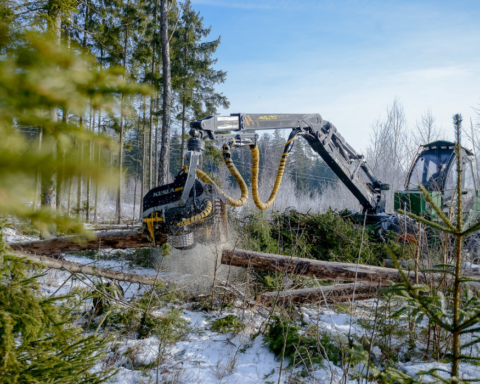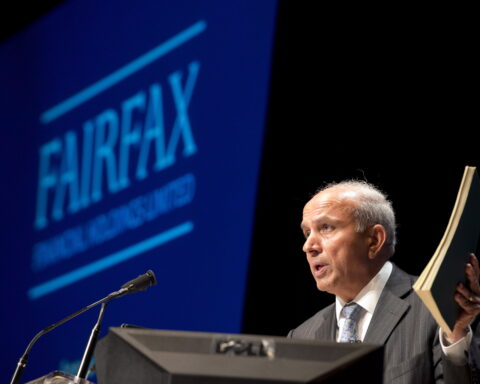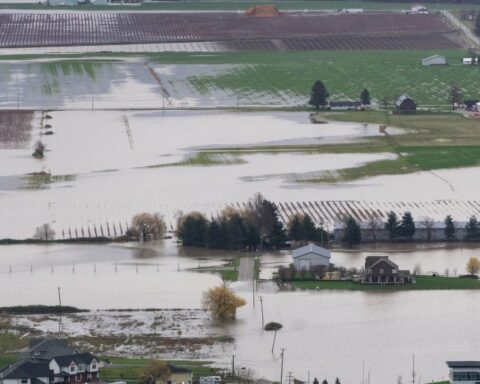By standing before the Calgary Chamber of Commerce and pledging our national pension fund’s continued support for the Alberta oil and gas industry, Canada Pension Plan Investment Board (CPPIB) CEO John Graham predictably told Alberta Premier Danielle Smith and her Big Oil allies exactly what they wanted to hear.
But the financing needs and expansion plans of oil and gas companies are incompatible with CPPIB’s mandate to ensure Canadians’ retirement security by investing “with a view to achieving a maximum rate of return without undue risk of loss.”
It should be obvious that achieving this mandate is dependent on stabilizing global temperatures at relatively safe levels. Canadians require a livable planet on which to retire, and climate scientists and energy modellers are clear that limiting global temperature increase to 1.5℃ and avoiding catastrophic impacts to our ecosystems, economy and financial system requires fossil fuels to be rapidly phased down.
This creates a difficult test for our national pension manager. CPPIB needs to tamp down the Alberta government’s efforts to upend Canada’s retirement fund and reassure Albertans that it provides value for money by delivering superior pension returns. At the same time, CPPIB must acknowledge the dire warnings of climate scientists and navigate the accelerating global market forces that are deterring institutional investors from investing in fossil fuels, of which Alberta is a major producer.
CPPIB appears to have flunked this test.
By caving to Premier Smith’s grievance politics and telling Calgary’s business community that CPPIB will continue to accept undue risk of loss in order to prop up an industry facing inevitable decline, Graham undermined the notion that CPPIB is a prudent arm’s-length pension manager that sits above politics.
He also signalled to Canadians that CPPIB is unwilling to make the difficult but necessary decisions to limit the exposure of the Canada Pension Plan (CPP) to increasingly high-risk fossil fuels.
Graham’s Calgary speech came just weeks after the International Energy Agency published its authoritative World Energy Outlook, which sees global demand for all fossil fuels peaking before 2030, under all scenarios, even if governments neglect to further strengthen and accelerate policies to reduce greenhouse gas emissions in line with climate goals.
By pledging to grow its portfolio of oil and gas assets, CPPIB is making an alarming bet on the world failing to limit global heating to safe levels, putting the CPP at risk from an accelerating energy transition and our retirement security at risk from catastrophic climate change. It’s almost as if CPPIB doesn’t understand that every 10th of a degree of temperature increase makes a livable planet less and less achievable.
Graham said in his Calgary speech that CPPIB holds $6 billion in assets in Alberta’s oil and gas industry, whose emissions continue to increase, putting Canada’s climate targets out of reach. He shared the stage with Teine Energy and Wolf Midstream, two Alberta-based fossil fuel companies owned by CPPIB – neither of which have committed to net-zero emissions.
CPPIB’s reluctance to acknowledge the need to phase out fossil fuels might also be influenced by the oil and gas interests prominently represented on its board. Four of the fund’s 12 directors are concurrently directors or executives of fossil fuel companies, including Kiwetinohk Energy, a Calgary-based natural gas producer and gas plant operator; Capital Power, an Edmonton-headquartered gas plant operator; Domo Gasoline, a western Canadian gasoline retailer; and Wajax Corp, an oil sands equipment and services provider. In case CPPIB needs a direct line to the oil and gas lobby, the president and CEO of the Canadian Association of Petroleum Producers is a former CPPIB executive based in Calgary.
Graham claimed that “some of the most responsibly produced conventional energy in the world is in Western Canada.” This is a fictitious line we expect to hear from oil lobbyists but shouldn’t hear from a prudent pension manager.
Greenhouse gas emissions from a barrel of Canadian oil are among the highest in the world compared with other producers. Studies estimate that methane emissions from Canada’s oil and gas sector are at least 1.5 times higher than reported, and in some cases 15 times higher. Recent research from the University of Calgary concludes that Alberta’s inactive and orphaned oil-and-gas-well problem is “an immense environmental and financial crisis” that could cost between $60 and $120 billion to address. Meanwhile, oil sands companies continue to leak toxic tailings into Alberta waterways with near impunity, contaminating ecosystems and exposing downstream Indigenous communities to harmful chemicals. The Alberta Energy Regulator is widely seen to be captured by the oil and gas industry it’s supposed to regulate.
Graham’s speech also included dubious statements about divestment and the pace of transition away from fossil fuels, claiming that the “global investment community has also changed its tune when it comes to fossil fuel divestment.” Similarly, CPPIB’s chief sustainability officer wrote in CPPIB’s 2023 Report on Sustainable Investing that “consensus has consolidated around the belief that the financial system should be empowered to finance the transition to a low-carbon future rather than mobilized to pursue a divestment agenda.”
This “consensus” is imaginary. The financial system must be aligned with a zero-carbon future, and many investors have stopped pretending that it’s possible to finance the decarbonization of fossil fuels. The only credible pathway to zero emissions for oil, gas and coal companies is to phase out production.
Already, investors with nearly US$41 trillion in assets have at least a partial investment exclusion on fossil fuels. In Canada, the Caisse de dépôt et placement du Québec (CDPQ) divested its oil and coal assets in 2022, while Ontario’s University Pension Plan, OMERS (the Ontario Municipal Employees Retirement System), HOOPP (Healthcare of Ontario Pension Plan), and IMCO (Investment Management Corporation of Ontario) all announced partial exclusions on investments in fossil fuels in the last year. Globally, some of the biggest pension funds in the world exclude fossil fuels from their portfolios, including Europe’s largest pension fund, ABP, the U.K.’s largest workplace pension scheme, Nest, and the U.S.’s fourth-largest pension fund, the New York State Common Retirement Fund.
There are clear financial reasons that global capital continues to flee the oil and gas sector, particularly Alberta’s oil sands. The industry is facing terminal decline, with billions of dollars of oil and gas assets set to become stranded if Canada and the world are to achieve their climate targets. CPPIB is behaving irresponsibly by pretending that Alberta can extract, refine and burn these assets, when an honest conversation is needed about supporting Albertan communities and workers through the transition away from fossil fuels.
CPPIB CEO John Graham’s response to Premier Smith’s Alberta Pension Plan gambit is entirely predictable. But in telling the world that CPPIB will continue to prop up high-risk oil and gas companies whose business model is fundamentally incompatible with a livable future, Graham must ask himself: is CPPIB behaving like a prudent arm’s-length pension manager investing in the best interests of 21 million Canadians or a cheerleader for an oil and gas industry facing inevitable, structural decline?
It’s impossible for CPPIB to be both.
Patrick DeRochie is the senior manager for Shift Action for Pension Wealth and Planet Health, a charitable project that tracks the fossil fuel investments and climate policies of Canadian pension funds and that mobilizes beneficiaries to engage their pension managers on the climate crisis.







